New Central Asia But Old Great Game? Ramifications of the Consultative Meeting in Astana
By Farkhod Tolipov
April 10, 2018, the CACI Analyst
On March 15, 2018, the presidents of Kazakhstan, Kyrgyzstan, Tajikistan and Uzbekistan and the speaker of Turkmenistan’s parliament gathered in Kazakhstan’s capital Astana for a long-awaited meeting. Notably, the meeting was five-lateral, not four-lateral like previous meetings, and was consultative. Over 10 years have passed since the latest regional meeting of the Central Asian leaders. Not least for geopolitical reasons, the regional integration process that started in 1991 has since declined. This consultative meeting signaled a possible revitalization of regional cooperation, while the region remains in the shadow of great power politics.
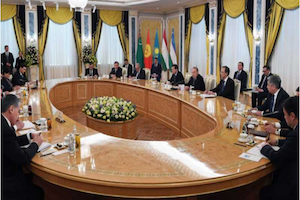
The Reemerging Self-Confidence of Central Asia
By Johan Engvall
March 22, 2018, the CACI Analyst
Something is stirring in Central Asia. The past two weeks have seen a flurry of bilateral and multilateral get-togethers, starting on March 9, when Uzbekistan’s President Shavkat Mirziyoyev arrived with great fanfare in Dushanbe for the first state visit of a president of Uzbekistan to Tajikistan since 2000. Less than a week later, on March 15, the presidents of Kazakhstan, Kyrgyzstan, Tajikistan and Uzbekistan as well as the speaker of Turkmenistan’s parliament gathered in Astana for the first exclusively regional “summit” in almost a decade. What do these meetings, each producing several intriguing bilateral and multilateral agreements and statements, mean for the prospects of Central Asian countries finally embarking upon a path of development through cooperation?
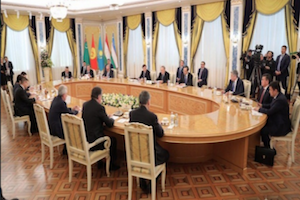
Deepening Central Asian Nonproliferation Partnerships
By Richard Weitz
February 22, 2018, the CACI Analyst
Preventing the proliferation of weapons of mass destruction (WMD) has been a priority for Uzbek-U.S. and Kazak-U.S. relations for decades. Uzbekistan and Kazakhstan are surrounded by nuclear weapons states and lie at the crossroads of potential WMD trafficking routes. As the U.S. struggles to keep North Korea and Iran from obtaining nuclear weapons, deny WMDs from terrorists and other actors, and sustain a major security presence in Central Asia, partnering with Uzbekistan and Kazakhstan against WMDs offers low-cost, high-yield opportunities.
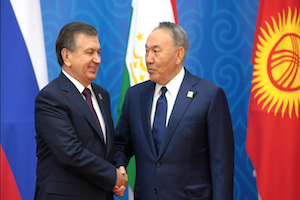
Baku-Tbilisi-Kars Railway to Become Central Asia's Gateway to Europe
By Fuad Shahbazov
December 7, 2017, the CACI Analyst
On October 30, 2017, Azerbaijan’s President Ilham Aliyev, along with Turkey’s President Recep Tayyip Erdogan, Georgia’s Prime-minister Giorgi Kvirikashvili, Kazakhstan’s Prime Minister Bakytzhan Sagintayev, and Uzbekistan’s Prime Minister Abdulla Aripov attended the opening ceremony of the long-delayed Baku-Tbilisi-Kars (BTK) railway. “The opening of the railway is of historic and strategic significance,” Aliyev said at the ceremony in the Caspian port city of Alat, south of Baku, to mark the departure of the first trains. In fact, the opening of the new railway provides an alternative route to existing rail services carrying goods from Asia to Europe.
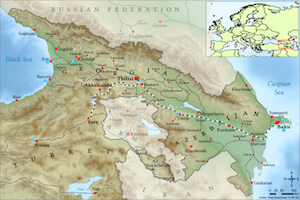
Uzbekistan Works to Reshape Central Asia
By Eldor Aripov
November 7, 2017, the CACI Analyst
On September 25, the UN concluded the 72nd session of its General Assembly at the headquarters in New York. Over a hundred heads of state and government, as well as foreign ministers and chiefs of delegations took part in the event. For the first time in 11 years, all member and observer states of the UN addressed the General Assembly. Uzbekistan’s President Shavkat Mirziyoyev also delivered a speech from the high rostrum of the UN, drawing considerable interest both inside Uzbekistan and abroad. Mirziyoyev stated that his government has taken effective measures to eradicate child and forced labor, abolish exit visas, intensify dialogue with international human rights organizations, and placed law enforcement bodies under parliamentary and civil control.
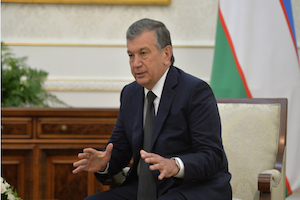





 Book S. Frederick Starr and Svante E. Cornell,
Book S. Frederick Starr and Svante E. Cornell,